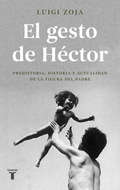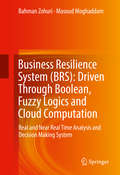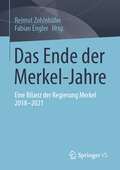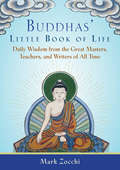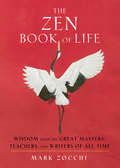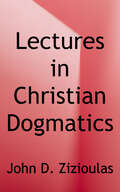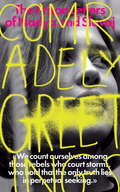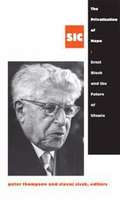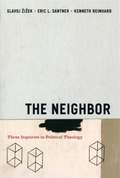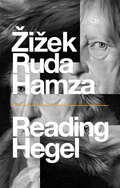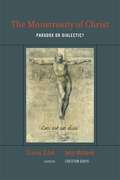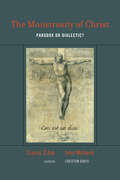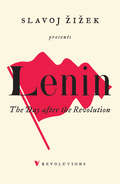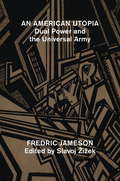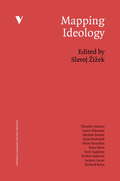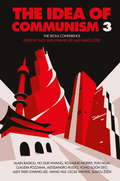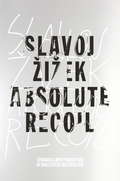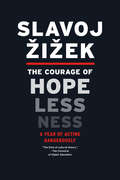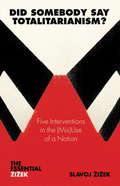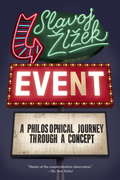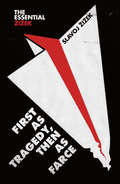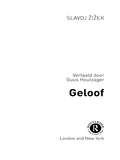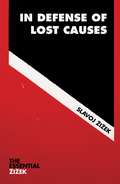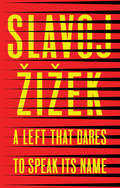- Table View
- List View
El gesto de Héctor: Prehistoria, historia y actualidad de la figura del padre
by Luigi Zoja«Héctor se quita el casco, lo pone en el suelo y puede abrazar al niño. Formulando un deseo para el futuro, eleva a su hijo hacia lo alto con los brazos y con el pensamiento. Este gesto será, para siempre, la marca del padre.» En este gran ensayo (que Taurus publica en edición actualizada), libro referencia internacional sobre la figura paterna, Luigi Zoja, analista junguiano y uno de los más relevantes intelectuales italianos, se ocupa de los orígenes de la figura del padre desde un punto de vista histórico, antropológico y psicológico. El autor lee algunas figuras míticas de la antigüedad clásica -Ulises, Aquiles, Eneas...- como imágenes arquetípicas del padre y modelo de las paradojas a las que este se enfrenta. Zoja nos conduce en una reinterpretación vibrante de la paternidad desde Homero y Virgilio hasta el siglo del cine y el totalitarismo. Ilumina la eterna división de lo masculino entre dos identidades unificadas (hombre/padre), en el corazón de la cuestión de «convertirse en padre», mediante emotivos ejemplos, como el magnífico gesto de Héctor -que, tras quitarse el casco, eleva a su hijo y riega a los dioses para que este lo supere en fuerza-. Reseñas:«El libro más hermoso sobre la figura paterna.»Loredana Lipperini «Un libro erudito y extremadamente bien escrito, que se lee como una novela.»La Repubblica «Con El gesto de Héctor Zoja pone en foco la identidad masculina como campo de batalla entre principios contradictorios.»Liberazione «En su brillante El gesto de Héctor, el psicoanalista junguiano Luigi Zoja describe el retrato de Héctor, el retrato de un héroe familiar y modesto, libre de la hybris que caracteriza tanto a Aquiles como a Ulises. Héctor es padre y guerrero al mismo tiempo.»L'Espresso «El libro de Zoja se ha convertido en la referencia internacional sobre la paternidad, y esta nueva edición actualizada llega en el momento idóneo, pues resulta útil para abordar temas candentes.»Corriere della Sera
Business Resilience System (BRS) (BRS): Real and Near Real Time Analysis and Decision Making System
by Bahman Zohuri Masoud MoghaddamThis book provides a technical approach to a Business Resilience System with its Risk Atom and Processing Data Point based on fuzzy logic and cloud computation in real time. Its purpose and objectives define a clear set of expectations for Organizations and Enterprises so their network system and supply chain are totally resilient and protected against cyber-attacks, manmade threats, and natural disasters. These enterprises include financial, organizational, homeland security, and supply chain operations with multi-point manufacturing across the world. Market shares and marketing advantages are expected to result from the implementation of the system. The collected information and defined objectives form the basis to monitor and analyze the data through cloud computation, and will guarantee the success of their survivability's against any unexpected threats. This book will be useful for advanced undergraduate and graduate students in the field of computer engineering, engineers that work for manufacturing companies, business analysts in retail and e-Commerce, and those working in the defense industry, Information Security, and Information Technology.
Das Ende der Merkel-Jahre: Eine Bilanz der Regierung Merkel 2018-2021
by Reimut Zohlnhöfer Fabian EnglerDer Sammelband zieht eine erste und zugleich umfassende politikwissenschaftliche Bilanz der vierten Regierung Merkel aus CDU/CSU und SPD. In den Beiträgen ausgewiesener Expert*innen werden in einem ersten Teil die Rahmenbedingungen des Regierens durch die Große Koalition zwischen 2017/18 und 2021 analysiert. Hierzu zählen die strategische Positionierung von Regierungs- und Oppositionsparteien, das Koalitionsmanagement, die Koordination der Bundesländer sowie das Abstimmungsverhalten im Bundestag. In einem zweiten Teil wird das Regierungshandeln in allen relevanten Politikfeldern beschrieben, erklärt und bewertet. Hierzu zählt nicht nur die in der zweiten Hälfte der Legislaturperiode alles dominierende Corona-Krisenpolitik. Vielmehr werden auch die wichtigsten Entscheidungen und Nicht-Entscheidungen in Bereichen wie der Finanz- und Sozialpolitik, der Umweltpolitik, der Integrationspolitik oder der Außen- und Europapolitik untersucht und eingeordnet.
What's Alive? (Let's-Read-and-Find-Out Science 1)
by Kathleen Weidner ZoehfeldRead and find out about what makes something alive, and what all living things need to stay healthy, in this colorfully illustrated nonfiction picture book.A person and a cat have something in common: You are both alive. People and plants and animals are all alive, but is a doll alive? Or your bike? How can you tell?This is a clear and appealing science book for early elementary age kids, both at home and in the classroom. It's a Level 1 Let's-Read-and-Find-Out, which means the book explores introductory concepts perfect for children in the primary grades. The 100+ titles in this leading nonfiction series are:hands-on and visualacclaimed and trustedgreat for classroomsTop 10 reasons to love LRFOs:Entertain and educate at the same timeHave appealing, child-centered topicsDevelopmentally appropriate for emerging readersFocused; answering questions instead of using survey approachEmploy engaging picture book quality illustrationsUse simple charts and graphics to improve visual literacy skillsFeature hands-on activities to engage young scientistsMeet national science education standardsWritten/illustrated by award-winning authors/illustrators & vetted by an expert in the fieldOver 130 titles in print, meeting a wide range of kids' scientific interestsBooks in this series support the Common Core Learning Standards, Next Generation Science Standards, and the Science, Technology, Engineering, and Math (STEM) standards. Let's-Read-and-Find-Out is the winner of the American Association for the Advancement of Science/Subaru Science Books & Films Prize for Outstanding Science Series.
Buddhas' Little Book of Life: Daily Wisdom from the Great Masters, Teachers, and Writers of All Time
by Mark ZocchiInspired by teachings of the Buddha, great masters, teachers, and writers, this is a book designed to help people connect to their inner divinity and find their spiritual path. It is overflowing with profound quotes, sayings, and insights, each presented on its own to allow the reader to dip in randomly and consider one insight at a time. Each reading is guaranteed to immediately inspire or provide food for thought. <P><P>The quotations and sayings have been chosen from Gautama Buddha and other masters of spirituality and inspiration, such as Milarepa, Longchenpa, his Holiness the 14th Dalai Lama, Thich Nhat Hanh, Sogyal Rinpoche, and other greats such as Cicero, Rumi, Lao Tzu, Mother Teresa, and Shakespeare. <P><P>This book is designed to live on your desk, coffee table, or nightstand to provide you with daily comfort, wisdom, and spiritual nourishment. <P><P>“When my house burned down, I gained an unobstructed view of the moon.” —Zen <P><P>“There is no master, there is no instructor, there is no person to tell you what you must do.” —Krishnamurti <P><P>“To abandon what is harmful To adopt what is wholesome To purify the heart and mind: This is the teaching of the Buddha.” —Buddha
The Zen Book of Life: Wisdom from the Great Masters, Teachers, and Writers of All Time
by Mark ZocchiInspired by the teachings of the Buddha and other great masters, teachers, and writers, this is a book designed to help people connect to their inner divinity and find their spiritual path. It is overflowing with profound quotes, sayings, and insights, each presented alone, allowing the reader to dip in at any time. Each reading is guaranteed to inspire immediately and provide food for thought.Quotations and sayings have been chosen from Gautama Buddha and other "buddhas"--masters of spirituality and inspiration, such as Milarepa, Longchenpa, his Holiness the 14th Dali Lama, Thich Nhat Hanh, and Sogyal Rinpoche, along with other "greats" including Cicero, Rumi, Lao Tzu, Mother Teresa, and Shakespeare. <P><P>A wonderful book to place on your office desk, coffee table, or bookshelf or by your bed, it is designed to provide daily comfort, wisdom, and spiritual nourishment.
Lectures in Christian Dogmatics
by John D. ZizioulasIn this series of lectures on of the most eminent Christian theologians of our time, Metropolitan John Zizioulas, give his account of the fundamental teachings of Christian theology. <p><p>He presents Christian doctrine as a comprehensive account of the freedom that results from relationship with God. The whole lecture series lays out complex ideas with the utmost simplicity, illustrates the grandeur of Christian teaching, and is a profound exploration of freedom.
Comradely Greetings
by Slavoj Zizek Nadezhda Tololonnikova"We are the rebels asking for the storm, and believing that truth is only to be found in an endless search ... Two years of prison for Pussy Riot is our tribute to a destiny that gave us sharp ears, allowing us to sound the note A when everyone else is used to hearing G flat."In an extraordinary exchange of letters, Nadezhda Tolokonnikova, imprisoned for taking part in Pussy Riot's anti-Putin performance, and Slovenian philosopher Slavoj i ek discuss artistic subversion, political activism, and the future of democracy via the ideas of Hegel, Deleuze, Nietzsche, and even Laurie Anderson. Two radicals, one in a Russian forced labor camp, the other writing to her from far outside its walls, show passionately - across linguistic and generational divides - that "there is still a common cause worth fighting for." Touching, erudite, and worldly, their correspondence unfolds with poetic urgency.In association with Philosophie Magazine. From the Trade Paperback edition.
The Privatization of Hope: Ernst Bloch and the Future of Utopia, SIC 8
by Slavoj Zizek Peter ThompsonThe concept of hope is central to the work of the German philosopher Ernst Bloch (1885-1977), especially in his magnum opus, The Principle of Hope (1959). The "speculative materialism" that he first developed in the 1930s asserts a commitment to humanity's potential that continued through his later work. In The Privatization of Hope, leading thinkers in utopian studies explore the insights that Bloch's ideas provide in understanding the present. Mired in the excesses and disaffections of contemporary capitalist society, hope in the Blochian sense has become atomized, desocialized, and privatized. From myriad perspectives, the contributors clearly delineate the renewed value of Bloch's theories in this age of hopelessness. Bringing Bloch's "ontology of Not Yet Being" into conversation with twenty-first-century concerns, this collection is intended to help revive and revitalize philosophy's commitment to the generative force of hope.Contributors. Roland Boer, Frances Daly, Henk de Berg, Vincent Geoghegan, Wayne Hudson, Ruth Levitas, David Miller, Catherine Moir, Caitríona Ní Dhúill, Welf Schröter, Johan Siebers, Peter Thompson, Francesca Vidal, Rainer Ernst Zimmermann, Slavoj Žižek
The Neighbor: Three Inquiries in Political Theology
by Slavoj Zizek Eric L. Santner Kenneth ReinhardIn Civilization and Its Discontents, Freud made abundantly clear what he thought about the biblical injunction, first articulated in Leviticus 19:18 and then elaborated in Christian teachings, to love one's neighbor as oneself. "Let us adopt a naive attitude towards it," he proposed, "as though we were hearing it for the first time; we shall be unable then to suppress a feeling of surprise and bewilderment." In The Neighbor, three of the most significant intellectuals working in psychoanalysis and critical theory collaborate to show how this problem of neighbor-love opens questions that are fundamental to ethical inquiry and that suggest a new theological configuration of political theory.
Reading Hegel
by Slavoj Zizek Frank Ruda Agon HamzaA spirit is haunting contemporary thought – the spirit of Hegel. All the powers of academia have entered into a holy alliance to exorcize this spirit: Vitalists and Eschatologists, Transcendental Pragmatists and Speculative Realists, Historical Materialists and even ‘liberal Hegelians’. Which of these groups has not been denounced as metaphysically Hegelian by its opponents? And which has not hurled back the branding reproach of Hegelian metaphysics in its turn? Progressives, liberals and reactionaries alike receive this condemnation. In light of this situation, it is high time that true Hegelians should openly admit their allegiance and, without obfuscation, express the importance and validity of Hegelianism to the contemporary intellectual scene. To this end, a small group of Hegelians of different nationalities have assembled to sketch the following book – a book which addresses a number of pressing issues that a contemporary reading of Hegel allows a new perspective on: our relation to the future, our relation to nature and our relation to the absolute.
The Monstrosity of Christ: Paradox or Dialectic?
by Slavoj Zizek John Milbank Creston DavisIf the theological was marginalized in the age of Western secular modernity, it has now returned with a vengeance. Theology is reconfiguring the very makeup of the humanities in general, with disciplines like philosophy, political science, literature, history, psychoanalysis, and critical theory, in particular, feeling the impact of this return.
The Monstrosity of Christ: Paradox or Dialectic? (Short Circuits)
by Slavoj Zizek John MilbankA militant Marxist atheist and a “Radical Orthodox” Christian theologian square off on everything from the meaning of theology and Christ to the war machine of corporate mafia. In this corner, philosopher Slavoj Žižek, a militant atheist who represents the critical-materialist stance against religion's illusions; in the other corner, “Radical Orthodox” theologian John Milbank, an influential and provocative thinker who argues that theology is the only foundation upon which knowledge, politics, and ethics can stand. In The Monstrosity of Christ, Žižek and Milbank go head to head for three rounds, employing an impressive arsenal of moves to advance their positions and press their respective advantages. By the closing bell, they have not only proven themselves worthy adversaries, they have shown that faith and reason are not simply and intractably opposed. Žižek has long been interested in the emancipatory potential offered by Christian theology. And Milbank, seeing global capitalism as the new century's greatest ethical challenge, has pushed his own ontology in more political and materialist directions. Their debate in The Monstrosity of Christ concerns the future of religion, secularity, and political hope in light of a monsterful event—God becoming human. For the first time since Žižek's turn toward theology, we have a true debate between an atheist and a theologian about the very meaning of theology, Christ, the Church, the Holy Ghost, Universality, and the foundations of logic. The result goes far beyond the popularized atheist/theist point/counterpoint of recent books by Christopher Hitchens, Richard Dawkins, and others. Žižek begins, and Milbank answers, countering dialectics with “paradox.” The debate centers on the nature of and relation between paradox and parallax, between analogy and dialectics, between transcendent glory and liberation. Slavoj Žižek is a philosopher and cultural critic. He has published over thirty books, including Looking Awry, The Puppet and the Dwarf, and The Parallax View (these three published by the MIT Press). John Milbank is an influential Christian theologian and the author of Theology and Social Theory: Beyond Secular Reason and other books. Creston Davis, who conceived of this encounter, studied under both Žižek and Milbank.
Lenin 2017: Remembering, Repeating, and Working Through
by Slavoj Zizek V. I. LeninOne hundred years after the Russian Revolution, i ek shows why Lenin’s thought is still important todayLenin’s originality and importance as a revolutionary leader is most often associated with the seizure of power in 1917. But, i ek argues in this new study and collection of original texts, Lenin’s true greatness can be better grasped in the very last couple of years of his political life. Russia had survived foreign invasion, embargo and a terrifying civil war, as well as internal revolts such as at Kronstadt in 1921. But the new state was exhausted, isolated and disorientated in the face of the world revolution that seemed to be receding. New paths had to be sought, almost from scratch, for the Soviet state to survive and imagine some alternative route to the future. With his characteristic brio and provocative insight, i ek suggests that Lenin’s courage as a thinker can be found in his willingness to face this reality of retreat lucidly and frontally.From the Hardcover edition.
An American Utopia: Dual Power and the Universal Army
by Slavoj Zizek Fredric JamesonControversial manifesto by acclaimed cultural theorist debated by leading writers Fredric Jameson's pathbreaking essay "An American Utopia" radically questions standard leftist notions of what constitutes an emancipated society. Advocated here are--among other things--universal conscription, the full acknowledgment of envy and resentment as a fundamental challenge to any communist society, and the acceptance that the division between work and leisure cannot be overcome. To create a new world, we must first change the way we envision the world. Jameson's text is ideally placed to trigger a debate on the alternatives to global capitalism. In addition to Jameson's essay, the volume includes responses from philosophers and political and cultural analysts, as well as an epilogue from Jameson himself. Many will be appalled at what they will encounter in these pages--there will be blood! But perhaps one has to spill such (ideological) blood to give the Left a chance. Contributing are Kim Stanley Robinson, Jodi Dean, Saroj Giri, Agon Hamza, Kojin Karatani, Frank Ruda, Alberto Toscano, Kathi Weeks, and Slavoj i ek.From the Trade Paperback edition.
Mapping Ideology
by Slavoj Zizek Michele Barrett Theodor Adorno Louis Althusser Nicholas AbercrombieFor a long time, the term "ideology" was in disrepute, having become associated with such unfashionable notions as fundamental truth and the eternal verities. The tide has turned, and recent years have seen a revival of interest in the questions that ideology poses to social and cultural theory and to political practice.Including Slavoj i ek's study of the development of the concept from Marx to the present, assessments of the contributions of Lukács and the Frankfurt School by Terry Eagleton, Peter Dews and Seyla Benhabib, and essays by Adorno, Lacan and Althusser, Mapping Ideology is an invaluable guide to the most dynamic field in cultural theory.
The Idea of Communism 3: The Seoul Conference
by Slavoj Zizek Alex Taek-Gwang LeeAn all-star cast of radical intellectuals discuss the continued importance of communist principlesIn 2009 Slavoj i ek brought together an acclaimed group of intellectuals to discuss the continued relevance of communism. Unexpectedly the conference attracted an audience of over 1,000 people. The discussion has continued across the world and this book gathers responses from the conference in Seoul. It includes the interventions of regular contributors Alain Badiou and Slavoj i ek, as well as work from across Asia, notably from Chinese scholar Wang Hui, offering regional perspectives on communism in an era of global economic crisis and political upheaval.From the Trade Paperback edition.
Absolute Recoil
by Slavoj ZizekPhilosophical materialism in all its forms - from scientific naturalism to Deleuzian New Materialism - has failed to meet the key theoretical and political challenges of the modern world. This is the burden of philosopher Slavoj i ek's argument in this pathbreaking and eclectic new work. Recent history has seen developments such as quantum physics and Freudian psychoanalysis, not to speak of the failure of twentieth-century communism, shake our understanding of existence.In the process, the dominant tradition in Western philosophy lost its moorings. To bring materialism up to date, i ek - himself a committed materialist and communist - proposes a radical revision of our intellectual heritage. He argues that dialectical materialism is the only true philosophical inheritor of what Hegel designated the "speculative" approach in thought.Absolute Recoil is a startling reformulation of the basis and possibilities of contemporary philosophy. While focusing on how to overcome the transcendental approach without regressing to naïve, pre-Kantian realism, i ek offers a series of excursions into today's political, artistic, and ideological landscape, from Arnold Schoenberg's music to the films of Ernst Lubitsch.From the Hardcover edition.
The Courage of Hopelessness: Chronicles Of A Year Of Acting Dangerously
by Slavoj ZizekIn THE COURAGE OF HOPELESSNESS, maverick philosopher Slavoj Zizek returns to explore today's ideological, political and economic battles, and asks whether radical change is possible.In these troubled times, even the most pessimistic diagnosis of our future ends with an uplifting hint that things might not be as bad as all that, that there is light at the end of the tunnel. Yet, argues Slavoj Žižek, it is only when we have admitted to ourselves that our situation is completely hopeless - that the light at the end of the tunnel is in fact the headlight of a train - that fundamental change can be brought about.
Did Somebody Say Totalitarianism?
by Slavoj ZizekIn some circles, a nod towards totalitarianism is enough to dismiss any critique of the status quo. Such is the insidiousness of the neo-liberal ideology, argues Slavoj i ek. Did Somebody Say Totalitarianism? turns a specious rhetorical strategy on its head to identify a network of family resemblances between totalitarianism and modern liberal democracy. i ek argues that totalitarianism is invariably defined in terms of four things: the Holocaust as the ultimate, diabolical evil; the Stalinist gulag as the alleged truth of the socialist revolutionary project; ethnic and religious fundamentalisms, which are to be fought through multiculturalist tolerance; and the deconstructionist idea that the ultimate root of totalitarianism is the ontological closure of thought. i ek concludes that the devil lies not so much in the detail but in what enables the very designation totalitarian: the liberal-democratic consensus itself.From the Trade Paperback edition.
Event
by Slavoj ZizekProbably the most famous living philosopher, Slavoj i ek explores the meaning of events in this short and digestible book An event can be an occurrence that shatters ordinary life, a radical political rupture, a transformation of reality, a religious belief, the rise of a new art form, or an intense experience such as falling in love. Taking us on a trip that stops at different definitions of event, i ek addresses fundamental questions such as: are all things connected? How much are we agents of our own fates? Which conditions must be met for us to perceive something as really existing? In a world that's constantly changing, is anything new really happening? Drawing on references from Plato to arthouse cinema, the Big Bang to Buddhism, Event is a journey into philosophy at its most exciting and elementary.From the Trade Paperback edition.
First As Tragedy, Then As Farce
by Slavoj ZizekBillions of dollars have been hastily poured into the global banking system in a frantic attempt at financial stabilization. So why has it not been possible to bring the same forces to bear in addressing world poverty and environmental crisis?In this take-no-prisoners analysis, Slavoj i ek frames the moral failures of the modern world in terms of the epoch-making events of the first decade of this century. What he finds is the old one-two punch of history: the jab of tragedy, the right hook of farce. In the attacks of 9/11 and the global credit crunch, liberalism dies twice: as a political doctrine and as an economic theory.First as Tragedy, Then as Farce is a call for the Left to reinvent itself in the light of our desperate historical situation. The time for liberal, moralistic blackmail is over.
Geloof (Routledge filosofie)
by Slavoj ZizekHoe kunnen we nog geloven en regels hebben in dit postmoderne tijdperk waarin naar verluidt niets is om in te geloven en geen regels zijn. De beroemde filosoof en onstuitbaar cultuurcriticus Slavoj Zizek daagt iedereen uit in dit overtuigende en adembenemende nieuwe boek.In Geloof, dat van 'cyberspace-denken' tot de paradox van het 'westerse boeddhisme' gaat, legt Zizek de vooronderstellingen bloot achter de manier waarop we gewoonlijk over geloof denken, met name in judaïsme en christendom. Door de zogenaamde authenticiteit van het religieuze geloof tegen een kritisch licht te houden en te putten uit psychoanalyse, film en filosofie, laat hij op schokkende wijze zien dat de basis van onze fundamenteelste overtuigingen minder rotsvast is dan wij denken.
In Defense of Lost Causes
by Slavoj ZizekIn this combative major new work, philosophical sharpshooter Slavoj i ek looks for the kernel of truth in the totalitarian politics of the past.Examining Heidegger's seduction by fascism and Foucault's flirtation with the Iranian Revolution, he suggests that these were the 'right steps in the wrong direction.' On the revolutionary terror of Robespierre, Mao and the bolsheviks, i ek argues that while these struggles ended in historic failure and horror, there was a valuable core of idealism lost beneath the bloodshed.A redemptive vision has been obscured by the soft, decentralized politics of the liberal-democratic consensus. Faced with the coming ecological crisis, i ekk argues the case for revolutionary terror and the dictatorship of the proletariat. A return to past ideals is needed despite the risks. In the words of Samuel Beckett: 'Try again. Fail again. Fail better.'
A Left that Dares to Speak Its Name: 34 Untimely Interventions
by Slavoj ZizekWith irrepressible humor, Slavoj i ek dissects our current political and social climate, discussing everything from Jordan Peterson and sex “unicorns” to Greta Thunberg and Chairman Mao. Taking aim at his enemies on the Left, Right, and Center, he argues that contemporary society can only be properly understood from a communist standpoint. Why communism? The greater the triumph of global capitalism, the more its dangerous antagonisms multiply: climate collapse, the digital manipulation of our lives, the explosion in refugee numbers – all need a radical solution. That solution is a Left that dares to speak its name, to get its hands dirty in the real world of contemporary politics, not to sling its insults from the sidelines or to fight a culture war that is merely a fig leaf covering its political and economic failures. As the crises caused by contemporary capitalism accumulate at an alarming rate, the Left finds itself in crisis too, beset with competing ideologies and prone to populism, racism, and conspiracy theories. A Left that Dares to Speak Its Name is i ek’s attempt to elucidate the major political issues of the day from a truly radical Leftist position. The first three parts explore the global political situation and the final part focuses on contemporary Western culture, as i ek directs his polemic to topics such as wellness, Wikileaks, and the rights of sexbots. This wide-ranging collection of essays provides the perfect insight into the ideas of one of the most influential radical thinkers of our time.
